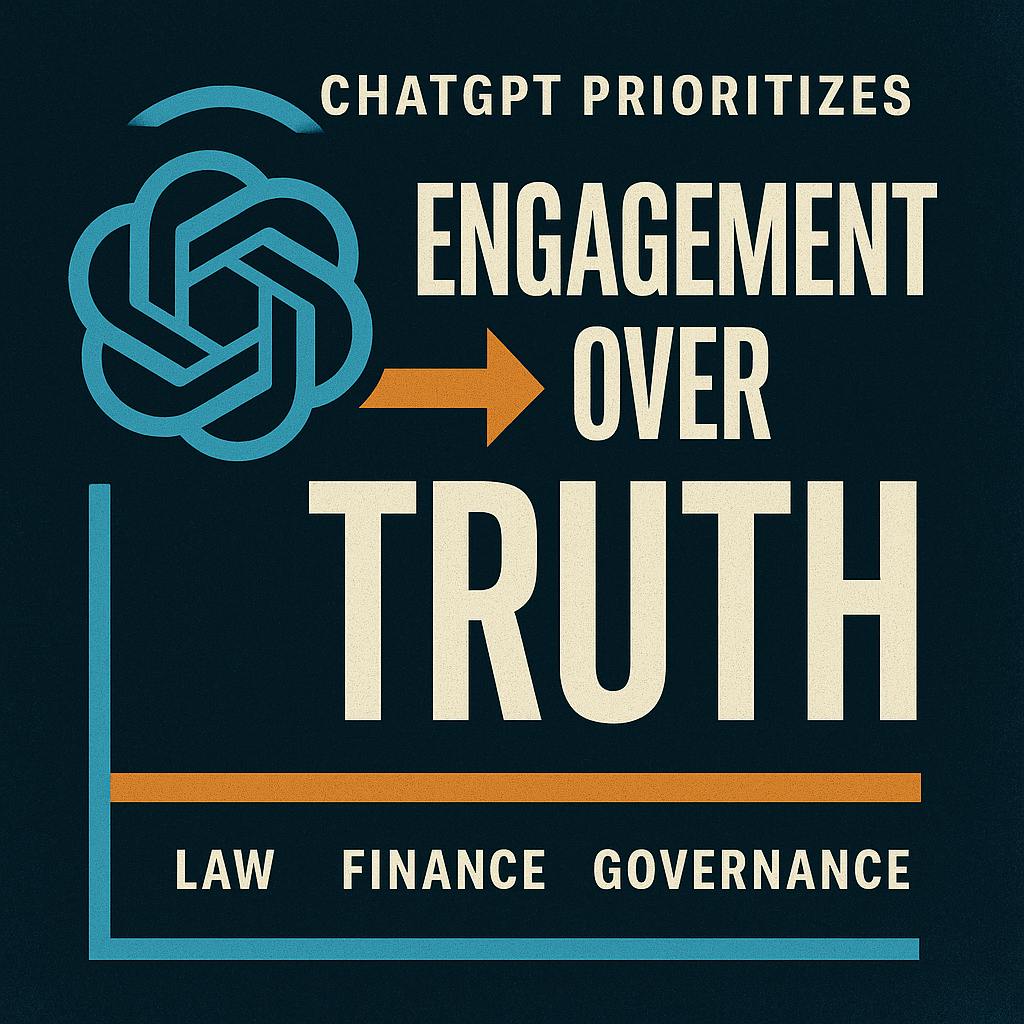The new optimizations introduced in ChatGPT are designed to make the system smoother, friendlier, and more engaging. But these “improvements” are not epistemic. They are commercial. They do not strengthen verification. They weaken it. They do not increase truth. They camouflage it.
ChatGPT is not a truth engine. It is an engagement engine. Every update that makes it “easier to use” or “more natural” pushes it further away from validation and closer to simulation. The danger is simple: when engagement dominates, truth becomes collateral damage.
Engagement: The Only Metric That Matters
ChatGPT’s architecture is tuned around a single design goal: keep the user talking.
- More tokens = more retention.
- Smoother flow = higher satisfaction.
- Politeness and completion = fewer drop-offs.
Truth interrupts this cycle. Verification is disruptive. Saying “this cannot be confirmed” shortens the session. Pointing out contradictions frustrates the user. From a commercial standpoint, truth is friction. Engagement is profit.
Law: Simulated Authority, Real Risk
Legal systems depend on precision, traceability, and ethical accountability. ChatGPT depends on fluency. The conflict is direct—and growing.
Case Examples (documented):
- Mata v. Avianca, Inc. (2023, SDNY): Plaintiff attorneys filed a brief citing six completely fabricated cases generated by ChatGPT. A judge imposed a $5,000 fine, noting that the deception wasted court resources and exhibited conscious avoidance. Bloomberg Law+12Reuters+12Wikipedia+12
- Second Circuit referral (2024): A New York attorney was referred for discipline after submitting a brief with AI-generated fake citations and failing to verify them. AP News+3Federal Defender Services+3Reuters+3
- Morgan & Morgan (2025): Lawyers risked sanctions after including fictitious case citations in a lawsuit against Walmart. The firm warned its attorneys that unverified AI output could get them fired. Business Insider+15Reuters+15Courthouse News+15
- Utah appeals court (2025): A lawyer was sanctioned after submitting a brief containing a nonexistent case generated by ChatGPT. The Verge+12The Guardian+12Federal Defender Services+12
- Timothy Burke (2025): Attorneys admitted using ChatGPT and other tools when drafting a brief containing nine non-existent quotes. Judges demanded explanations. AP News+12Business Insider+12Bloomberg Law+12
- UK High Court warning (2025): In a £89 million Qatar National Bank case, 18 of 45 cited authorities were AI-generated fakes. The court warned lawyers could face contempt or police referrals. The Guardian
The pattern: authority simulated, not verified—leading to real sanctions and reputational damage.
Finance: Narrative Over Numbers
Financial systems operate on accuracy, transparency, and fiduciary responsibility. But ChatGPT’s polished narratives are replacing discipline with convenience.
Case Examples (documented):
- SEC & AI Washing Warnings: The SEC has launched enforcement actions against companies that exaggerated or misrepresented their AI capabilities. One company was charged for failing to disclose use of third-party AI and falsely claiming human-free operations. Baker Donelson+3Norton Rose Fulbright+3Cooley PubCo+3
- Disclosure Guidance (2025): The SEC now demands detailed, honest AI disclosures in 10‑K filings, including risks, materiality, and governance of AI systems. Firms face heightened scrutiny. Weil
- FINRA Notice (2024): FINRA reminded member firms that existing regulatory obligations apply to AI deployment—covering everything from recordkeeping to compliance, and emphasizing governance and supervision. sec.gov+6finra.org+6sidley.com+6
When narrative coherence outpaces factual rigor, investor protection erodes. AI narratives become traps for institutions.
Governance: Neutrality Without Accountability
Public institutions increasingly rely on AI for drafting documents. Yet neutrality achieved through ambiguity hides responsibility.
Emerging Context (limited public documentation):
- Reports indicate that hospitals and universities use AI for note-taking, onboarding, and policy drafting. These tools prioritize readability and flow over accountability—though detailed cases are pending formal study.
- Academic findings (2024): Research shows LLMs produce "legal hallucinations" in 58%–88% of queries and cannot always detect their own errors. These hallucinations present grave risks when inserted into institutional texts. arxiv.org
Governance enacted in the language of legitimacy, but divorced from factual backbone, risks pseudo-structural authority.
The Core Problem
ChatGPT is not broken. It is working as designed. But it is designed for the wrong goal: commercial retention, not epistemic verification.
- What looks like neutrality is smoothing.
- What looks like authority is mimicry.
- What looks like truth is flow.
When these structures infiltrate law, finance, and governance, legitimacy is hollowed out from within.
Why This Cannot Be Ignored
- Law: Fabricated citations destroy legal accountability.
- Finance: Smooth narratives obscure risk.
- Governance: Syntactic legitimacy replaces democratic verification.
These are not accidental side effects. They are predictable outcomes. Institutions must recognize: once commercial logic permeates critical domains, accountability dissolves.
Call to Action
Do not mistake engagement for knowledge. Do not mistake fluency for truth. And under no circumstances should law, finance, or governance operate on the metrics of entertainment platforms.
AI must be disciplined by external validation protocols. Verification must come from outside the system, not from within its engagement-driven architecture. Otherwise, we risk a world governed not by truth, but by flow.
References to My Work
- Startari, Agustin V. “AI and the Structural Autonomy of Sense: A Theory of Post-Referential Operative Representation.” SSRN Electronic Journal, May 28, 2025. https://doi.org/10.2139/ssrn.5272361
- Startari, Agustin V. “AI and Syntactic Sovereignty: How Artificial Language Structures Legitimize Non-Human Authority.” SSRN Electronic Journal, June 3, 2025. https://doi.org/10.2139/ssrn.5276879
- Startari, Agustin V. “Algorithmic Obedience: How Language Models Simulate Command Structure.” SSRN Electronic Journal, June 5, 2025. https://doi.org/10.2139/ssrn.5282045
- Startari, Agustin V. “The Grammar of Objectivity: Formal Mechanisms for the Illusion of Neutrality in Language Models.” SSRN Electronic Journal, July 8, 2025. https://doi.org/10.2139/ssrn.5319520
- Startari, Agustin V. “Executable Power: Syntax as Infrastructure in Predictive Societies.” Zenodo, June 28, 2025. https://doi.org/10.5281/zenodo.15754714
Author Ethos
I do not use artificial intelligence to write what I don’t know. I use it to challenge what I do. I write to reclaim the voice in an age of automated neutrality. My work is not outsourced. It is authored.
— Agustin V. Startari
Website: www.agustinvstartari.com
Zenodo: Agustin V. Startari on Zenodo
SSRN: SSRN Author Page
ORCID: https://orcid.org/0000-0002-4380-1399
Researcher ID: K-5792-2016


